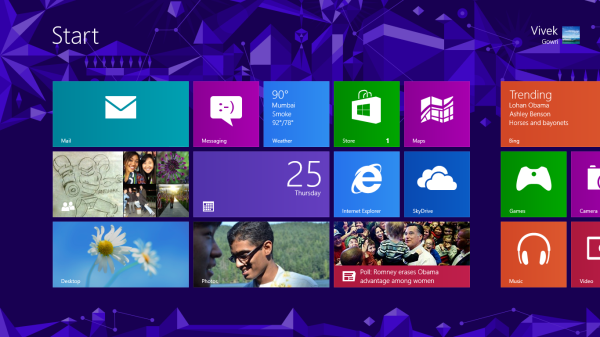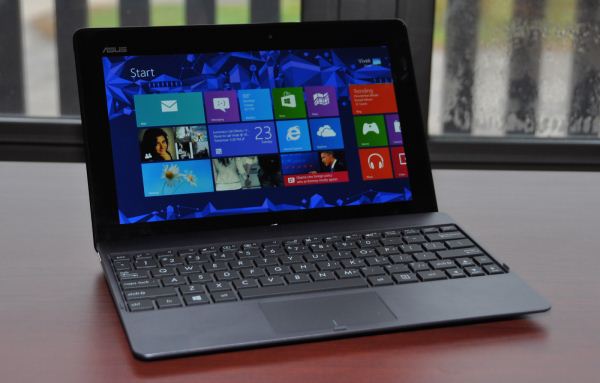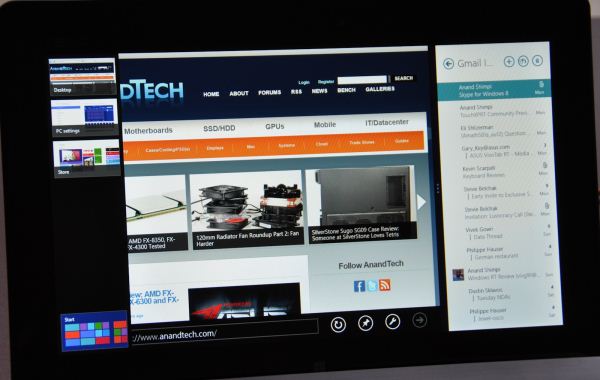The Windows RT Review
by Vivek Gowri & Anand Lal Shimpi on October 25, 2012 12:00 PM EST- Posted in
- Windows RT
- Operating Systems
- Microsoft
- Mobile
- Windows 8
- Tablets
Final Words
So, ten thousand words later, what can we take away from Windows RT? It’s definitely another superb user experience design from Microsoft. Say what you will about Windows Phone 7, but damn if that UI isn’t gorgeous. The Metro design language translates over to the tablet form factor really well, resulting in the Windows Modern UI. We’ve obviously known how Modern UI looks and feels through the various Windows 8 preview builds, but Windows RT ends up being more focused and offering a more consistent experience. It’s a side effect of being limited to apps from the Windows Store - because you spend a significant majority of your time in the new Windows UI, desktop use is minimized. In Windows RT, the Windows Desktop serves the purpose of being the more capable and powerful layer underneath the main portion of the UI, as opposed to Windows 8, which sometimes feels like the new Windows UI existing as an impractical interface layer on top of the traditional desktop.
The dichotomy just feels more comfortable in Windows RT than I feel like it has been in the previous Windows 8 systems that I’ve dealt with. It’s nice. This is the first time I feel like I’ve really connected with the new Windows UI, it makes a ton of sense to me now. I still think for mouse-based navigation, you’re better off treating it as a glorified Start menu, but it’ll be interesting to see how legacy programs affect the use of Modern UI in x86-based Windows 8 tablets as the Windows Store matures.
If you’re really concerned about the state of third-party apps, you just have to wait and see. I’ve seen a lot of snap judgements made about Windows RT in the last couple of days based on the dearth of good applications in Windows Store, and while I agree with that sentiment, I feel like it’s extremely shortsighted to write off the ecosystem already. Neither version of the OS has gone on sale yet, and we know that there are a number of applications that will go live on the official release date, as well as many more coming in the weeks ahead.
This isn’t like Windows Phone, where we need to see whether the platform will get any market traction before predicting the growth of the app marketplace. You can basically assume that the marketplace will expand significantly unless somehow everyone stops buying Windows-based systems on October 26th. The odds of that situation arising seem relatively low, so my bet is that the strength of the ecosystem will be a non-issue a month from now.
The default inclusion of Office 2013 and the emphasis on physical keyboards makes Windows RT the first tablet platform to significantly address the question of productivity. Combined with the equally advanced task switching and multitasking built into the UI, and this becomes the first legitimately useful tablet operating system out there. The Galaxy Note 10.1 wasn’t bad, but it was a single device that built additional functionality into a custom Android skin. Every single Windows RT slate comes out of the box with Office and the ability to have multiple active application windows. It’s just a few steps ahead of competing tablet platforms at this point.
And it’s not like RT loses out on a content consumption front. It’s paired with what is a very strong entertainment store and gaming franchise in Xbox Live, and the browsing experience is definitely competitive. It’s also a competent e-reader, with Amazon’s Kindle being one of the headlining apps currently in Windows Store. It even matches the power efficiency of the other ARM-based tablets, with competitive battery life and standby time. Obviously, ARM is the driving factor in the low power consumption, but it’s good to see that Windows is on a similar level as iOS and Android.
So this is a tablet platform that can do a good job of replacing both an iPad and an ultraportable in a number of different workflows. You get the best of both worlds, in some sense - Windows RT tablets have similar form factors to the iPad and leading Android tablets, and offer near-equal battery life, performance, and user experience, but they also give you the added benefit of strong productivity applications and the power of Windows Desktop. From a conceptual standpoint, almost anything you can do with an iPad can be done equally well (or close) on a Windows RT tablet, but the desktop-caliber office suite and versatile multitasking interface of Windows RT are impossible experiences to replicate on the iPad. It's not a perfect operating system by any means, but it brings a new dimension to the tablet space. So if you’re looking for a new tablet this fall, Windows RT deserves your consideration.













233 Comments
View All Comments
steven75 - Friday, November 2, 2012 - link
It's not just the number where Windows Phones is lacking, but the quality and functionality. Where are the Garageband clones for WP? Where is the full touch-based office suite you get with iWork?HardwareDufus - Thursday, October 25, 2012 - link
Huge Failure. Sorry.I go to the Windows Store.. I see the Surface RT Advertisement.
In 2 seconds I should be able to determine from that page what Applications are available for the Surface RT, before I agree to Pre-Order one for $699 (64GB version). I should be just that easy...it should be more consumer oriented. But it's not.
Huge Failure. Sorry.
So, I click software... I click finance... Is there anyway to quickly determine which one of these is available for Windows8RT? Quicken, Quickbooks, Sage? No... there isn't. So, I have to waste allot of time....
Who's going to pay $699 for a device when they can't easily check which applications are available. This is a huge failure and AnandTech has really glossed over it.... Disappointed in you guys!
faizoff - Thursday, October 25, 2012 - link
Well all you have to do is click on any app and then select the details section. Each app has 3 sections, the details app tells you where it runs on.Ta da.
HardwareDufus - Thursday, October 25, 2012 - link
yeah...let me click on this one...select details... whoops not for RT..
ta da..
let me click on this one.. select details.... whoops snot for RT...
tada...
let me click on this other one... select details... whoops not for RT...
tada...
Your right.. this is so easy... I love this hunt and peck method of finding apps for Windows RT... this is the most amazing applications store I've ever seen... and I'm so glad that I don't have anyother means of purchasing apps for RT..
HardwareDufus - Thursday, October 25, 2012 - link
I don't want 10's of apps.. I want basic browsing, messaging (that means FB, Twtr, etc..), accounting, productivity (had by office...awesome!), maps (google, street, ). I want like 8 apps. BUt I can't easily and quickly determine if they are available.Now, I wouldn't care if the apps could be purchased other places... but it's a closed eco system and I have to buy them from the Microsoft Store... SO it should be easier to see what's available.... for Surface with Win8RT... And it's not easy!
andrewaggb - Thursday, October 25, 2012 - link
Yeah, the windows 8 store needs work. As Anand said, it's hard to find the good stuff unless you specifically search for it. Also the updates section doesn't tell you anything about the update before installing it (not that I could tell anyways). And I didn't see any way to keep you're apps up to date automatically, or roll back to previous versions if you had a problem etc.The store is usable, but probably the weakest of the built in apps.
Another thing about the store that bugs me is that when you look through a list of apps it doesn't indicate which ones you have installed already or provide a way to filter out ones you've already got. Why would I want to see the ones I've already got?
ratte - Thursday, October 25, 2012 - link
Maybe I missed this in the review but isn't Office on RT "not for commercial, nonprofit, or revenue-generating activities".I of course assume that Anand has paid for a commercial licence before he wrote the Surface piece ;-).
glynor - Thursday, October 25, 2012 - link
In the review, you basically dismiss the serious problem they have with app selection by saying "it'll come soon", and point to all the millions of Windows 8 PCs their going to sell over the next year or so as the reason.I understand that, but I'm still VERY skeptical.
The problem isn't that they're going to sell Windows 8 PCs. The problem is this:
If you are an existing Windows developer, what is going to motivate you to completely throw away your existing products and start over again to develop against the WinRT APIs in order to release a Modern UI style application that will run on Windows 8/RT and be sold through the app store?
* You're still going to have to continue to sell and develop your existing applications, for everyone who DOESN'T upgrade to Windows 8. It isn't like those shiny new Modern UI apps are going to run on my Windows 7 PC at home, no anyone else's.
* All of the Windows 8 systems sold will still run your desktop application fine, so then you get the benefit of the massive pre-existing installed base of Windows users.
* The ONLY people "left out" if you don't develop a WinRT-based Modern UI application will be owners of Windows RT devices.
So... If you're Adobe, or any other big development house, what do you do?
You wait and see. Re-writing Photoshop or AutoCAD, if it is even possible in the Modern UI, is no small challenge. Expecting these companies to drop everything and start over from scratch, and do it quickly, seems... Naive.
I expect we'll see a lot of developers of existing cross-platform apps (iOS and Android developers) adopt Modern UI. Everything else? I wouldn't expect an RT-friendly version of Photoshop, Lightroom, or Quicken anytime soon, if ever. It'll all depend on sales of Windows RT devices.
haukionkannel - Thursday, October 25, 2012 - link
Well the trend has been that mobile devices like smart phones and pad has become much, much more important. It is not hard to see that they will be more important and that there will be much more mobile devices than normal desktops in the future...What Joe average do with their computers? They read mail, they read some web pages and show and watch pictures from their children chindrens... What is the best device for that... Mobile computer. It is pity, but hard working picture editors, writers and gamers are tiny minority.
Summasummarum, there will be a lot of Modern UI aplications, much more that there will be normal desktop applications.
glynor - Thursday, October 25, 2012 - link
Generally, I agree.However, the argument seems to be:
There will be plenty of Windows RT capable apps soon because Microsoft is going to sell a bunch of Windows 8 desktop PCs, so there will be a huge built-in ecosystem. And look at all these existing Windows developers we already have.
My answer is:
Maybe.
But all those Windows 8 desktop PCs will not run the Modern UI style apps optimally, and they will also run "normal" Windows applications. You can't port desktop apps to WinRT (the API), and they won't work on Windows RT devices. And, a huge portion of those new Windows 8 boxes are going to go to businesses (like mine) where they're immediately going to be re-imaged to Windows 7.
If you are a current Windows developer, what is your motivation to do all the work to "start over" with a brand new product, if most of your CURRENT customers can't use it at all (they're on XP or Windows 7), or won't use them much because they're on traditional desktops and laptops?
The path of least resistance is to just keep developing your traditional Windows desktop application and wait and see what happens.
Is Microsoft in a better position than RIM or Palm was to expand their new ecosystem? Sure. But it is a few years later too. And they're competing with an established, massive ecosystem on two fronts (iOS and Android).
I'm not saying "it will never happen." But I don't think it is a sure thing. And I don't think the "they'll run on Windows 8 too" is as big of an ace-in-the-hole as Anand and Vivek seem to think. It'll help, but I think they'll need a LOT of help and some luck.
If Windows 8 gets a bad rep (deserved or not) like Vista from consumers on desktop and laptop machines, and OEMs keep selling lots of Windows 7 machines, they could be in for a world of hurt.